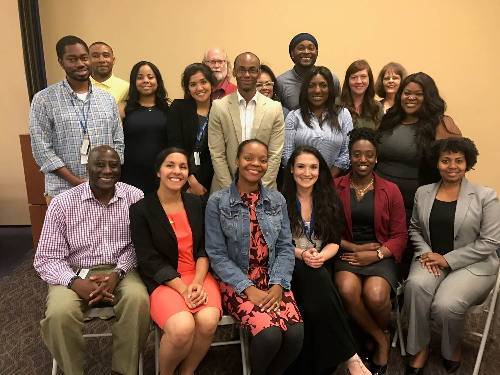- Home >
- Psychology
- > Ph.D. Psychology - Counseling Psychology Concentration
Ph.D. in Psychology
|
2021 Council of Counseling Psychology Training Programs (CCPTP) Award Winner!
2019 American Psychological Association (APA) Suinn Minority Achievement Program Award Winner!
Program Philosophy: Counseling Psychology Concentration ***In Fall 2021, the Graduate Record Examination (GRE) or Millers Analogy Test (MAT) will be waived . The counseling psychology concentration at Tennessee State University is grounded in a scientist-professional model of training. The program is designed to develop competent, ethical practitioners and facilitators of learning with a multicultural perspective capable of integrating science and practice in a variety of setting and modalities. The integration of research and practice is a central theme of scientist-professional model of training. Problems in professional practice stimulate the need for systematic inquiry through research, the results of which then lead to modification of both theory and practice of professional psychology. The program curriculum has been designed to provide students with a solid foundation in the study of psychology, a broad range of competencies in research methodology, and the knowledge and skills required for professional interventions in individual, group, and family therapy. The faculty provide an eclectic choice of theoretical orientations which represent, Psychodynamic, CBT, Systems, Interpersonal, and Integrative theories. Graduates of the program are employed in a wide range of settings, including university faculty, university counseling centers, community mental health centers, VA hospitals, and private practices. Program Aims The Aims below guide the program curriculum and philosophy. The courses and program related activities reflected in these aims serve as the foundation the Program uses to prepare students for careers in health service psychology, research, consultation, and to be change agents within the field of Counseling Psychology. Aim #1 – The Program facilitates the development of life-long, self-reflective professional behavior and cultivation of a holistic and contextual worldview. Aim #2 – The Program facilitates the development of effective skills in clinical application, research methodologies, and professional interactions with individuals, groups, and systems. Aim #3 – The Program facilitates the awareness, knowledge, and skills necessary to address the broadly defined issues of respect for pluralism and human dignity. Aim #4 – The Program facilitates the commitment to advocacy, justice, and systems change for the betterment of individuals and communities at large. Faculty Research Interest Faculty and students in the department are actively involved in professional development and research either individually or as a part of research groups. A brief list of the Core Counseling Psychology Faculty research interests include: group processes, relationships, gender issues, couples and families, intimacy, trauma, respect for pluralism and mental health/behavioral medicine, eating disorders, health discrepancies, resiliency, values, and leadership training, psychodynamic theory, supervision/training, vocational identity development, personality, career development, identity development, Ecological Counseling, Integrative Therapy, holistic health, and Experiential Therapy. About Tennessee State University Tennessee State University (TSU) is a comprehensive, urban, coeducational, HBCU, land-grant university founded in 1912. The 450-acre main campus, with more than 65 buildings, is located in a residential setting close to downtown Nashville. In addition to the main campus, The Avon Williams Off-Campus Instructional Site is located directly in downtown, near the center of the business and government district. Located in the state capital and second-largest city in Tennessee, Nashville is a thriving center of government, business, industry, culture and education. Nashville, considered the hub of the nations country music industry, is also home to numerous parks complete with hiking trails and other recreational areas. Professional sports attractions include the Tennessee Titans Football team and the Nashville Predators NHL Hockey Team. Success of Our Students In recent years, 100% of all students applying for internship match were placed in settings such as university counseling centers and VA medical centers. For the last seven years the internship match rate has been 98%. Graduates of the program are employed in a wide range of settings including university faculty, university counseling centers, community mental health centers, federal prisons, and private practices. Accreditation The doctoral concentration in Counseling Psychology is accredited by the American Psychological Association [Commission on Accreditation, 750 First Street, NE, Washington, DC, 20002-4242, 202-336-5979] and is a designated Doctoral Program in Psychology of the American Association of State Psychology Boards (AASPB) and the Council for the National Register of Health Service Providers in Psychology. The most recent visit for the Counseling Psychology concentration occurred in Fall of 2018, resulting in the program’s re-accreditation for 10 years. The next site visit is scheduled for the 2028 site visit cycle. Tennessee State University is accredited by the Commission on Colleges of the Southern Association of Colleges and Schools [1866 Southern Lane, Decatur, GA 30033-4097, 404-679-4500] to award the Associate, Bachelor, Masters, Specialist in Education, and Doctoral degrees. For further information about the Counseling Psychology Concentration, click on the following links: Future Students:
Current Students: Faculty Research:
|
|
Doctoral Practicum Handbook 2026-2028 Dissertation Handbook 2022-2023 Student Outcomes, Admissions, & Other Data
NEWSFLYER: /psychology/OPEN%20HOUSE%20FLYER.pdf
|
webpage contact:
Psychology Dept





